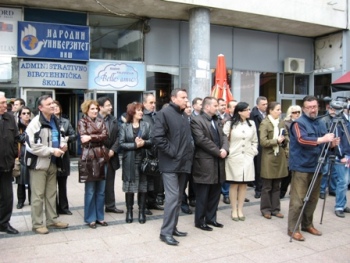`COMMUNAL POLICE FOR THE ORDER IN SERBIAN CITIES`
14.10.2009.
`Communal police, that will in be in Nis active from the next spring, will be solving communal and other problems and will be contributing to maintenance of communal order in the city as the motto of our campaign –`COMMUNAL POLICE FOR THE ORDER IN SERBIAN CITIES` said Aleksandar Radosavljevic, state secretary of Ministry for Public Administration and Local Self-Government to the people of Nis while presenting the authorizations of communal police within the activities of visiting Serbian cities.
This presentation was held on central- King Milan Square in Nis in the presence of many representatives of the City institutions who have solving of communal problems matters within their scope of authorities. The representatives of Administration of Palilula Municipality were also present during this presentation. The citizens of Nis could see and take leaflets that explain many roles and authorizations of communal police. It was also discussed on communal police help degree to one more quality city life. `Communal police will solve all communal problems of citizens like water supply, atmosoheric and waste waters outfreight and spout, public cleaness matters, life environment protection, cultural goods, care issue of local roads and streets, transportation in city and suburbial parts, setting of part-time business objects, parking matters`, said the state secretary Radosavljevic. Member of City Council Miodrag Radovic expressed the hope that Nis would be one of the first cities to form communal police service. He expressed the opinion that communal service would contribute to preserving communal order and life quality improvement in our city. The communal police will be formed by the City as internal organizational unit and the number of communal policemen will respond the number of the citizens due to the last listing: per every 5 thousand of people, the City will have one communal policeman / policewoman. Radovic also pointed at the significance of preserving public order and communal organization. The special part belongs to the future cooperation of communal police and citizens.
